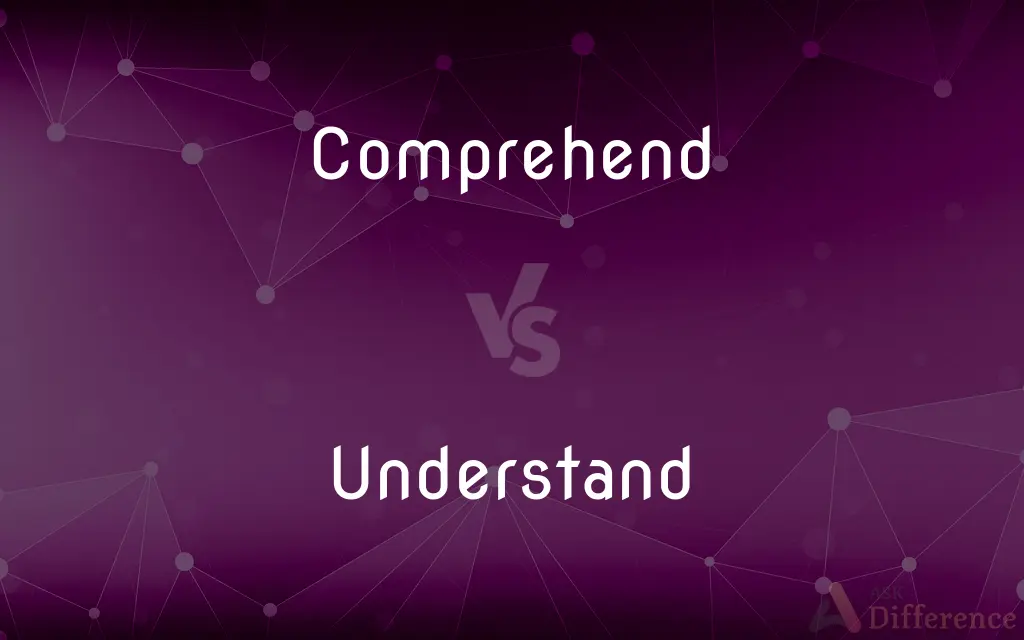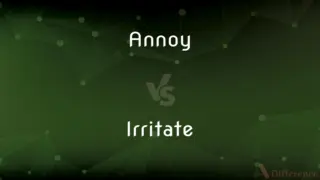Comprehend vs. Understand — What's the Difference?
By Tayyaba Rehman — Updated on November 1, 2023
Comprehend refers to grasping the meaning of something, while understand implies deeper insight and knowledge.

Difference Between Comprehend and Understand
Table of Contents
ADVERTISEMENT
Key Differences
Comprehend means to grasp or perceive the meaning of something. It suggests an ability to take in and interpret information. Understanding, however, goes beyond just grasping the meaning; it implies a deeper insight and knowledge, often including the reasons behind something.
When you comprehend a concept, you have a basic grasp of it. To understand it means you can apply it, relate it to other concepts, or explain it to others. Comprehension is the initial step, understanding is the deeper realization.
In language learning, you might comprehend the words spoken to you, but understanding them involves grasping the nuances, the context, and the implied meanings. Comprehension is often the first level of learning, understanding is the mastery.
Comprehension can occur quickly, understanding usually takes time. You can comprehend a fact immediately, but understanding its implications or underlying principles may require deeper thought and experience.
Both comprehension and understanding are important in communication and learning. Comprehension is the gateway to understanding; understanding is the goal of true learning and effective communication.
ADVERTISEMENT
Comparison Chart
Meaning
Grasping the meaning of something
Deeper insight and knowledge
Depth
Initial grasp or interpretation
Deeper realization, application, explanation
Application
Understanding the surface level
Applying, relating, explaining
Time
Can occur quickly
Usually takes time
In Language Learning
Grasping the words spoken
Grasping nuances, context, implied meanings
Compare with Definitions
Comprehend
Grasping the meaning of something.
I comprehend the instructions, but I'm not sure how to proceed.
Understand
Having deep insight and knowledge.
She understands the subject so well, she could teach it.
Comprehend
Initial step in learning.
Once you comprehend the rules, you’ll start to understand the strategy.
Understand
Mastery of a concept.
Understanding a language means more than just knowing the words.
Comprehend
Grasping surface-level meaning.
They comprehended the joke, but its cultural significance eluded them.
Understand
Insight beyond the surface.
He understands the implications of the decision, not just the facts.
Comprehend
Perceiving information.
He comprehended the basics of the game very quickly.
Understand
Grasping reasons behind something.
He understands why the machine broke down, not just how to fix it.
Comprehend
Understanding at a basic level.
She comprehended the lecture but didn’t understand the complex theories.
Understand
Perceive the intended meaning of (words, a language, or a speaker)
He didn't understand a word I said
She understood what he was saying
He could usually make himself understood
Comprehend
Grasp mentally; understand
I simply couldn't comprehend what had happened
He couldn't comprehend her reasons for marrying Lovat
Understand
Interpret or view (something) in a particular way
As the term is usually understood, legislation refers to regulations and directives
Comprehend
Include, comprise, or encompass
A divine order comprehending all men
Understand
Be sympathetically or knowledgeably aware of the character or nature of
I understand how you feel
Picasso understood colour
Comprehend
To take in the meaning, nature, or importance of; grasp.
Understand
To become aware of the nature and significance of; know or comprehend
She understands the difficulty involved.
Comprehend
To have as part of something larger; encompass or include.
Understand
To become aware of the intended meaning of (a person or remark, for example)
We understand what they're saying.
We just disagree with it. When he began describing his eccentric theories, we could no longer understand him.
Comprehend
To include, comprise; to contain.
Understand
To know and be tolerant or sympathetic toward
Hoped that they would understand my complaint.
Comprehend
To understand or grasp fully and thoroughly.
Understand
To know thoroughly by close contact or long experience with
That teacher understands children. I understand the basics of car repair.
Comprehend
To contain; to embrace; to include; as, the states comprehended in the Austrian Empire.
Who hath . . . comprehended the dust of the earth in a measure.
Understand
To learn indirectly or infer, as from hearsay
I understand his departure was unexpected. Am I to understand you are staying the night?.
Comprehend
To take in or include by construction or implication; to comprise; to imply.
Comprehended all in this one word, Discretion.
And if there be any other commandment, it is briefly comprehended in this saying.
Understand
To assume to be or accept as agreed
It is understood that the fee will be $50.
Comprehend
To take into the mind; to grasp with the understanding; to apprehend the meaning of; to understand.
At a loss to comprehend the question.
Great things doeth he, which we can not comprehend.
Understand
To supply or add (words or a meaning, for example) mentally
A verb is understood at the end of the statement "Yes, let's.".
Comprehend
Get the meaning of something;
Do you comprehend the meaning of this letter?
Understand
To have understanding, knowledge, or comprehension.
Comprehend
To become aware of through the senses;
I could perceive the ship coming over the horizon
Understand
To have sympathy or tolerance
You're upset. I understand.
Comprehend
Include in scope; include as part of something broader; have as one's sphere or territory;
This group encompasses a wide range of people from different backgrounds
This should cover everyone in the group
Understand
To learn something indirectly or secondhand; gather.
Understand
(transitive) To grasp a concept fully in one's mind, especially (of words, statements, art, etc.) to be aware of the meaning of and (of people) to be aware of the intent of.
I'm sorry. I don't understand.
Please try to understand. It's not you, it's me.
Understand
To believe, to think one grasps sufficiently despite potentially incomplete knowledge.
I understand that you have a package for me?
In the imperative mood, the word “you” is usually understood.
Understand
To stand underneath, to support.
Understand
To have just and adequate ideas of; to apprehended the meaning or intention of; to have knowledge of; to comprehend; to know; as, to understand a problem in Euclid; to understand a proposition or a declaration; the court understands the advocate or his argument; to understand the sacred oracles; to understand a nod or a wink.
Speaketh [i. e., speak thou] so plain at this time, I you pray,That we may understande what ye say.
I understand not what you mean by this.
Understood not all was but a show.
A tongue not understanded of the people.
Understand
To be apprised, or have information, of; to learn; to be informed of; to hear; as, I understand that Congress has passed the bill.
Understand
To recognize or hold as being or signifying; to suppose to mean; to interpret; to explain.
The most learned interpreters understood the words of sin, and not of Abel.
Understand
To mean without expressing; to imply tacitly; to take for granted; to assume.
War, then, war,Open or understood, must be resolved.
Understand
To stand under; to support.
Understand
To have the use of the intellectual faculties; to be an intelligent being.
Imparadised in you, in whom aloneI understand, and grow, and see.
Understand
To be informed; to have or receive knowledge.
I came to Jerusalem, and understood of the evil that Eliashib did for Tobiah.
Understand
Know and comprehend the nature or meaning of;
She did not understand her husband
I understand what she means
Understand
Perceive (an idea or situation) mentally;
Now I see!
I just can't see your point
Does she realize how important this decision is?
I don't understand the idea
Understand
Make sense of a language;
She understands French
Can you read Greek?
Understand
Believe to be the case;
I understand you have no previous experience?
Understand
Be understanding of;
You don't need to explain--I understand!
Understand
Applying and relating concepts.
Once you understand the formula, you can solve any problem.
Common Curiosities
Is understanding always deeper than comprehension?
Generally, yes. Understanding implies a deeper level of insight.
In language learning, what comes first, comprehension or understanding?
Comprehension typically comes first, followed by deeper understanding.
Is comprehension sufficient for effective communication?
It’s a start, but true understanding is often necessary for effective communication.
Does understanding require more time than comprehension?
Yes, understanding usually takes more time and deeper engagement with the material.
Is understanding necessary for applying knowledge?
Yes, understanding is crucial for effectively applying and using knowledge.
Can you comprehend something without fully understanding it?
Yes, comprehension is often the first step before full understanding.
Can comprehension lead to misunderstandings?
Yes, if comprehension is shallow and not followed by deeper understanding, it can lead to misunderstandings.
Can you have a high level of comprehension with low understanding?
Yes, you can grasp the meaning (comprehend) without fully understanding the deeper aspects.
Does comprehension involve grasping nuances and implications?
Comprehension is more about grasping the basic meaning, while understanding involves nuances and implications.
Can you understand something without comprehending it first?
No, comprehension is usually necessary before you can truly understand something.
Is it possible to understand something without being able to explain it?
Yes, sometimes people understand concepts intuitively but find it hard to articulate their understanding.
Can someone comprehend a concept but find it irrelevant?
Yes, comprehension doesn’t automatically imply relevance or interest.
Is understanding the same as agreeing?
No, one can understand a point of view or concept without agreeing with it.
Can comprehension and understanding be measured?
They can be assessed through various methods, but true understanding can be harder to quantify.
Does understanding always imply application?
Often, but not always. One can understand a concept without necessarily being able to apply it.
Share Your Discovery

Previous Comparison
Account vs. Description
Next Comparison
Annoy vs. IrritateAuthor Spotlight
Written by
Tayyaba RehmanTayyaba Rehman is a distinguished writer, currently serving as a primary contributor to askdifference.com. As a researcher in semantics and etymology, Tayyaba's passion for the complexity of languages and their distinctions has found a perfect home on the platform. Tayyaba delves into the intricacies of language, distinguishing between commonly confused words and phrases, thereby providing clarity for readers worldwide.















































